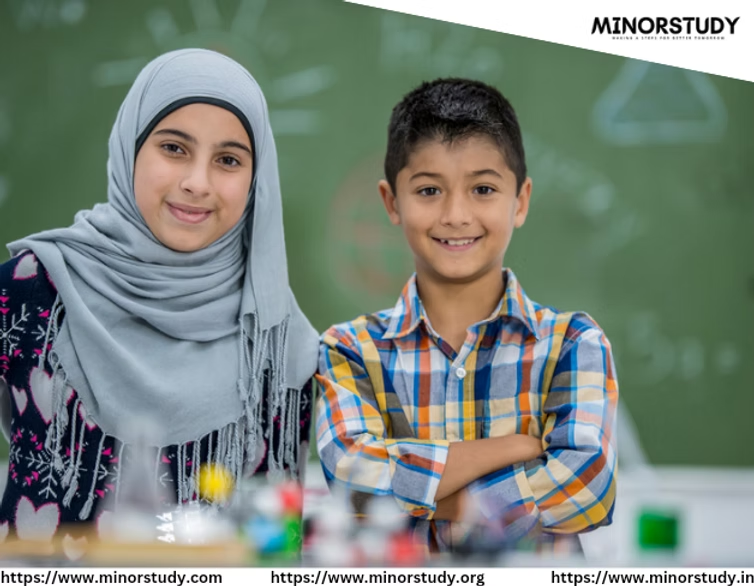Arabic Studies (Minor)
Arabic Studies: The Arabic Studies Minor is an interdisciplinary program designed to provide students with a comprehensive understanding of the Arabic language, culture, history, and society. It offers students the opportunity to develop language skills while exploring the rich literary, historical, and cultural traditions of the Arab world. This minor is ideal for those looking to complement their major with knowledge of a widely spoken and culturally significant language.
Program Overview
Minor Name: Arabic Studies
Type: Minor
Discipline: Arts and Social Sciences
Duration: Typically 1-2 years when taken alongside a major degree
Focus: Arabic language proficiency, literature, cultural studies, and understanding of the Arab world.
Key Learning Outcomes
Language Proficiency: Achieve a working knowledge of Modern Standard Arabic (MSA) and/or regional dialects, including speaking, reading, writing, and listening skills.
Cultural Awareness: Gain insight into the cultural, social, political, and historical contexts of the Arab world.
Literary Appreciation: Study Arabic literature, including classical and contemporary works, and understand their cultural significance.
Cross-Cultural Communication: Develop the ability to interact effectively in Arabic-speaking environments, both personally and professionally.
Critical Thinking: Analyze cultural, historical, and political issues in the Arab world from multiple perspectives, fostering critical thinking and understanding.
Core Curriculum
Year 1 (Foundational)
Introduction to Arabic Language
Basics of Modern Standard Arabic (MSA), focusing on vocabulary, grammar, and sentence structure.
Arabic Script and Pronunciation
Learning the Arabic alphabet, pronunciation, and foundational writing skills.
Introduction to Arabic Culture and History
An overview of the history, culture, and major social structures in the Arab world.
Arabic Media and Contemporary Issues
Exploring current events and how the Arabic language is used in media across different countries.
Year 2 (Intermediate)
Intermediate Arabic Language
Building on foundational language skills with a focus on increasing fluency in reading, writing, and speaking.
Arabic Literature
Introduction to classical and modern Arabic literature, examining significant authors, works, and themes.
Arabian Politics and Society
Study of the political landscape, social structures, and key issues in contemporary Arab countries.
Arabic Dialects and Regional Variations
Exposure to the differences in Arabic dialects spoken in various Arab regions, with a focus on practical communication.
Year 3 (Advanced)
Advanced Arabic Language Skills
In-depth language training with a focus on fluency, advanced grammar, and writing skills.
Arabic Film and Media
Analyzing Arabic cinema and media as reflections of culture, politics, and identity in the Arab world.
Islamic Studies and Arabic Literature
Study of the intersection between Islam and Arabic literature, exploring religious texts and their literary significance.
Arabic Translation and Interpretation
Skills in translating texts from Arabic to English (or another language), with emphasis on nuances and cultural context.
Year 4 (Capstone and Specialization)
Arabic and Global Politics
Exploration of the role of Arabic-speaking nations in global politics, including issues like geopolitics, oil, and international relations.
Contemporary Arab Society and Culture
A focus on current cultural, social, and political trends shaping modern Arab society.
Capstone Project
A research project or practical application of Arabic studies in real-world contexts, demonstrating proficiency and cultural understanding.
Study Abroad/Internship Opportunities
Immersive experiences in Arabic-speaking countries or internships with organizations working with Arab communities.
Skills Acquired
Arabic Language Proficiency: Mastery of Modern Standard Arabic and potential familiarity with regional dialects, enhancing communication skills.
Cultural Competence: Deep understanding of the customs, traditions, history, and social norms of the Arab world.
Literary and Analytical Skills: Ability to analyze classical and contemporary Arabic literature and media with an academic perspective.
Cross-Cultural Communication: Effective communication with Arabic-speaking individuals in professional, social, and academic contexts.
Research and Translation: Competence in translating and researching Arabic texts, including literary works, media, and historical documents.
Career Opportunities
Graduates with an Arabic Studies Minor are well-equipped for careers in fields that require linguistic and cultural knowledge of the Arab world, such as:
Diplomacy and International Relations: Working in embassies, consulates, or international organizations that engage with Arab-speaking countries.
Translation and Interpretation: Serving as professional translators or interpreters for Arabic-speaking communities or organizations.
Education: Teaching Arabic language and culture at various educational levels, from primary school to university.
Journalism and Media: Reporting on Middle Eastern affairs or working with media organizations that focus on the Arab world.
Non-Governmental Organizations (NGOs): Working with international development organizations, humanitarian efforts, and non-profits focused on Arab regions.
Business and Trade: Engaging in business development, marketing, or trade relations with Arabic-speaking countries.
Tourism and Cultural Exchange: Working in tourism, cultural exchanges, or heritage preservation in Arabic-speaking regions.
Significance of the Program
Global Importance: Arabic is spoken by millions worldwide and is a key language for geopolitical, economic, and cultural influence.
Cultural Insight: Offers a deep dive into the culture, traditions, and history of the Arab world, fostering greater understanding and tolerance.
Professional Versatility: With global connections across various industries, proficiency in Arabic opens opportunities in diplomacy, business, journalism, and education.
Why Choose This Minor?
The Arabic Studies Minor is an excellent choice for students who are interested in the Arabic language and the rich culture of the Arab world. Whether you are pursuing a career in international relations, business, journalism, or any field that values cultural understanding and linguistic competence, this minor provides valuable insights and practical skills. It enhances your ability to communicate across cultural boundaries and understand one of the most influential regions in the world today.








